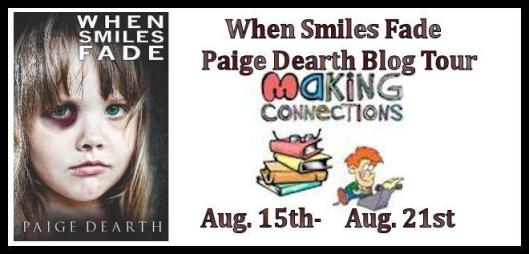Tags
Believe Like a Child, books, guest blogging, guest posts, Paige Dearth, Thriller, When Smiles Fade, Write what you know, writing
Today we focus on the work of Paige Dearth, author of Believe Like a Child and When Smiles Fade.
In her debut novel, Believe like a Child, the main character Alessa is the victim of child abuse from her uncle. The story is one of redemption and of a woman taking control of her own life.
In When Smiles Fade, her latest novel released this year, the main character Emma is also abused as a child as you can see from this synopsis:
Emma was unloved from the moment she was born. Her earliest memory is being severely beaten by her father, Pepper Murphy, when she was just eight-yearsold. Seething with resentment over the sacrifice of his dreams for a woman he cares little about and children he never wanted, Pepper chooses to blame his older daughter. Her mother, Valerie, makes matters worse with her verbal abuse, leaving Emma isolated with a man that had no boundaries in punishing his daughter, taking his abuse to unimaginable levels. Emma’s father’s coldblooded beatings and the ultimate abuse to which he subjects her, lays the foundation of the person she becomes. As she matures into a resourceful teenager, she is unwilling and unable to stifle her desire for revenge. Reaching her breaking point she can no longer control the impulse to fight back and finally takes matters into her own hands. Having learned the art of hatred from her father and the mastery of manipulation from her mother, young Emma now sets out to make a better life for herself, leaving the memory of the abused child she had once been behind her. Hardened by the heartless brutality she encounters and the dangerous situations she must overcome in the course of her journey, she faces every challenge that comes her way in her quest for a normal life for herself and for those she loves. Finally a person emerges from within that guides her toward a better life until she learns of a secret that sets her on the path of ultimate redemption.
Both stories contain inspiration taken from Paige’s own life. She herself was a victim of child abuse at an early age and spent her childhood not believing that she had the potential to much in the way of ambition. When she finally went to college at the age of 29, she did not even believe that she was capable of passing the college level courses and yet she finally left college with an MBA 8 years later and a feeling that she had conquered her fear of learning. There followed a successful career in corporate America and finally a writing career that has seen her earn a finalist place in the thriller category of the National Indie Excellence Book Awards. Paige’s own life is an example of someone seeking to improve their lot.
So, both novels mirror events in Paige’s life, she has used her real life to inspire her writing. This ties in with the common author’s adage of ‘write what you know’. This saying is often mocked, especially in fantasy and SF, because you cannot ‘know’ what it is like to be a Dragon or an Orc or a wizard. However, this is applying an ad absurdum argument because there are still elements of a person’s life which will apply to any fictional character. Likewise in a suspense thriller, there are almost certainly going to be things in there that an author has not experienced but the trick is to take the things that have happened to you and apply them. Writing what you know is all about adding a level of emotional veracity to the writing that is conveyed to the reader. The use of the term ‘what you know’ is actually a misnomer as it really is not about knowledge at all. Knowledge is what you get from books and, these days, from the internet – whether by looking something up on Google or (as commonly happens) asking a question on a forum populated by experts in that area. Instead it is all about the experience – the emotional and physical impact that this has on you as an individual. I believe that this level of veracity is important. You don’t need to necessarily add emotional context to every event in your story but it does help if you have some personal life experiences you can call upon if needed. They may not be as traumatic as those described here, I would not wish such things on anyone if it could be at all avoided, but any life event can be useful – the tastes of food, the smell of the inside of a car, what it feels like to spend all day in a library reading ancient books. An author should be prepared to reflect upon their experiences and consider what they can learn from them and what they can use to improve their writing.
You can find out more about Paige on her website: www.paigedearth.com.
You can buy her books on the following links:
Later this year she also plans to release her third novel so please keep an eye out for that.

